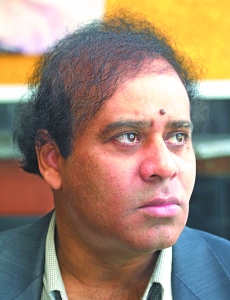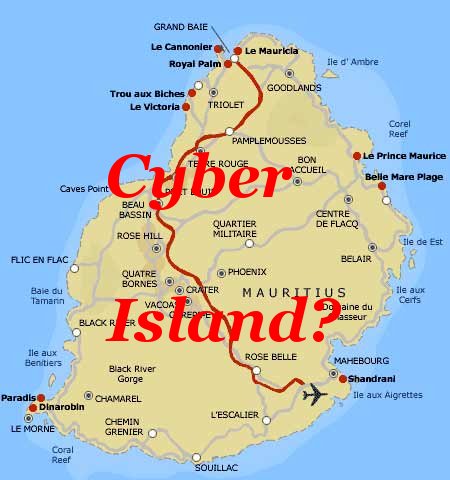I was interviewed by Pauline Etienne in L’express-Samedi following the arrest of three journalists (two from Radio Plus and the chief ed of Week-End).

You can read the interview on my blog here or on the site of L’express here.
Society
ICTA and Facebook

So, after the Facebook – ICTA controversy, Trilock Dwarka, Chairman of the Authority, has admitted that the decision to block access to Facebook completely on Thursday 8th Nov (a black day for the Mauritian online democratic community) was excessive in an interview with L’Express on Tuesday 13th. But, he was shrewd enough to lay the blame completely on his director, Krishna Oolun. One can only wait for the latter’s reaction to confront the two versions. Is this the latest manifestation of the ‘Chairman vs. Director’ pandemic that seems to affect most of our parastatal bodies these days (look at Enterprise Mauritius, NPCC, IBA, MBC, etc.)?
However this did not prevent the guy from trying to find some justifications to the decision by evoking problems such as frauds, cyber-bullying and minors being at risk (Is the PM a minor, BTW, who needs so much protection?). The typical discourse of people who want to control what we read, see and hear… They say they want to protect us, but they are caught more often protecting themselves or their interests or those who can promote/demote them (their temporary Gods on earth)!
Anyway, isn’t it funny that the guy says there is a need to have a position paper on social networking? Bet you he did not even know what this means a few months ago. And, for god’s sake, will they have position papers on every new platform that gets created on the Internet (and the pace is accelerating; who, in Mauritius, knew about Facebook two years back?). So, let’s have a position paper on Hi5, MySpace, Orkut, every single blog and forum, e-mails, chats, newsgroups, YouTube, Yahoo, Flickr, Google, Amazon, and what not. At least, it would keep them busy… Provided they don’t end up with a silly campaign like the NCB anti-spam campaign (which did not have spam companies like RKCommunications out of business).
BTW, with Avinash, we were reflecting on how emblematic it is that those organisations get called Authority (IBA, ICTA) carrying this connotation of central control (whereas new media and Internet are the exact opposite). In France, the equivalent of the Independent Broadcasting Authority is the Conseil Supérieur de l’Audiovisuel (CSA) and the equivalent of ICTA is the Commission Nationale Informatique et Liberté (CNIL)… Would the CNIL do a similar (dis)service to Chirac, Sarkozy et tutti quanti? Yes, this is disservice as the response from the Mauritian Facebook Community is more violent than the initial parodic pages of the PM. Just type the name of Navin Rangoolam in the search field of Facebook and you will see what I mean. The groan is growing day by day… Aster la li pu vine vraiment vilain!
And finally, on telecommunications costs: how much time will they continue to take us for fools? When it comes to applying new reductions in tariffs, it takes a month or so to be able to do that for administrative reasons: it takes time to adjust and deploy the new tariffs (aren’t they computerised in this so-called cyber island?). But when it comes to raising prices, all operators are suddenly very efficient at deploying the new tariffs over a single day at times.
This is paradise island…
Joel de Rosnay

French futurologist and scientist Joël de Rosnay gave a conference last week at UOM on ‘Nouvelles Technologies, Innovations et Résistances au Changement’. He drew a well organised map and catalogue of the crucial areas of innovation and listed the many stumbling blocks that need to be overcome in order to make the most of these new technologies with special reference to Mauritius (with which he has some family ties BTW).
He identified the main areas as being those of infotechnologies (basically Internet 2.0, what he calls ‘technologies de la relation’), biotechnologies (research in genetics), nanotechnologies and ecotechnologies (solar energies). I was particularly interested in listening to his talk about new information technologies as I have read one of his books ‘La Révolte du pronetariat’ which I bought last year and also use in my class for ‘New Forms of Media’. Joël de Rosnay’s enthusiasm about the Internet revolution, what he calls the ‘media of the masses’ (in opposition to ‘mass media’) is unabated and he even came up with a funny equation when it comes to the new business model i.c.w. the technologies of relation which runs as follows:
FLUX + BUZZ = BIZZ
Meaning (from what I have understood) that businesses need to attract people (by providing information-rich services for free) to create flux and those people will themselves attract other people through recommendations thus creating buzz and the business will be there.
His intense presentation cited, inter alia, the Long Tail, the idea of collective intelligence, new management styles (systemic as opposed to hierarchical). More interestingly, he also criticised the way the Cyber island initiative has turned out (in his words more a technopark where big companies pay big money to rent a locale), his initial vision being more that of a technological pole with incubators, public exhibition and meeting places to learn about technological developments. Yet, he still seems optimistic as he mapped out some ideas about the use of technology for tourism purposes (e.g. info on mobiles for guided tours, WiMax everywhere).
His presentation was so packed that it is not possible to summarise all the ideas he evoked, which were all enthusiastically received by a small audience composed of well-known entrepreneurs, academics and a few students. One can only wonder how much of his advice will have been understood and implemented… But, it’s refreshing to hear people who are on the same wavelength from time to time. Lifts your spirits up temporarily until you hear about the Facebook faux-pas of the ICTA, that is!
Notre cirque politique
Lu dans L’Express-Samedi du 27 octobre, dans la rubrique ‘Confidentiels’:
Motus et bouche cousue
Le bureau du Premier ministre a émis des ordres très stricts. Les conseillers en communication ne sont plus autorisés à parler à la presse sans autorisation de leurs ministres. Une circulaire dans ce sens a été envoyée aux attachés de presse.
Des conseillers en communication qui ne peuvent pas communiquer… On aura tout vu dans ce pays! L’explication de cette décision se trouve sans doute dans les pages de l’Express-Dimanche du 21 octobre où Bettina Cadinouche, conseillère en com du PM lâche quelques vérités crues du style
‘Mais pour moi, la MBC est tout sauf un outil de propagande ; ce sont des fossoyeurs.’,
‘Des yes-men, il y en a suffisamment parmi les ministres, les députés et les visiteurs d’un jour.’
Ce qui est étonnant c’est que Dinesh Ramjuttun, lui, a eu tout le loisir de déverser des critiques directes à l’encontre des ministres pendant plusieurs jours sans qu’aucune circulaire de ce type n’ait été émise (en tout cas cela n’a pas été rapporté par la presse).
Au contraire, selon ses dires, Navin l’a gentiment prié de rester pendant un bon bout de temps malgré son ‘insolence’… jusqu’à ce que l’indécence de ce super conseiller (qu’il n’a pas reçu pendant 4 bons mois) ne devienne insoutenable.
Quant aux partis de l’opposition, comme on dit ici, topette vaut pas morette (pas sûre de l’orthographe). Tantôt ils semblent en passe de se faire les yeux doux, tantôt c’est l’insulte infantile. Paul, Pravind, Ashok, et maintenant Dinesh, quel panthéon!
Y’a de quoi se mettre à regarder Tulsi…
The Cyber Island project

In my last post, I invited my readers to fill in a survey about ICT, Society and Poverty in Mauritius for a paper I had to present at a conference on Poverty and Development which took place on the 1st and 2nd October at Bell Village. I am here posting the slides I used for my presentation as well as some results of the online survey which attracted some 40 respondents (thanks to all). Though the results cannot be deemed to be statistically representative, they are nonetheless interesting as they provide some preliminary insights into the preceptions vis-à-vis what I call ‘The Cyber Island project’.
And key findings from the survey:
- – All expressed conviction that ICT are important to society & cannot be ignored
- – Most (84%) felt ICT can help Mauritius achieve social progress with some specifically referring to the potential of such technologies for reducing economic disparities and alleviating poverty by generating jobs and wealth, and others evoking the facilitation of communication and also the easier connection with knowledge centres and other nations.
- – 59% firmly believed such technologies can effectively help alleviate poverty (by contributing to education which helps people out of poverty, by creating employment, by increasing productivity and generating wealth which may be subject to taxes to be used for poverty reduction or even used by businesses for CSR programmes targeting poverty.
- – Above 60% (67%) of respondents expressed moderate to serious doubts about the ‘cyber island’ project. Most felt that the local conditions for ICT deployment and use are inadequate and insufficient to bring social progress in Mauritius.
- – Regarding progress achieved towards realising the project, 54% felt not much has been achieved so far. While some felt that the cyber towers are a step forward, that many youngsters are working in the ICT sector and that computers have entered most spheres of our life, others felt that this is not enough. The latter complained that many of our public services are not properly computerised, that the standards of ICT education are much lower than those of developed countries and even felt that employment in the sector is insignificant.
In essence, it seems that current Internet users agree that ICT are an important feature of modern societies and, as such, the use thereof should be promoted in order to impact positively on social inclusion and development. Yet, they also feel that the grand ‘cyber island’ rhetoric is overstretched as there is a gap between the discourse and the practice.
In other words, that Dissemination is too slow.
Small survey on ICT, Society and Poverty
I am currently conducting a small survey on ICT, Society and Poverty in Mauritius and would appreciate if Mauritian readers could take just a few minutes to fill in the online survey (it won’t take you more than 5 minutes).
The data will be made available here as soon as it is completed. And, if there are enough responses, it will be presented at a conference on poverty in Mauritius, which is to take place beginning of October (I will post details).
Thanks a lot for your help. You can also ask your friends to fill in. The more the better.